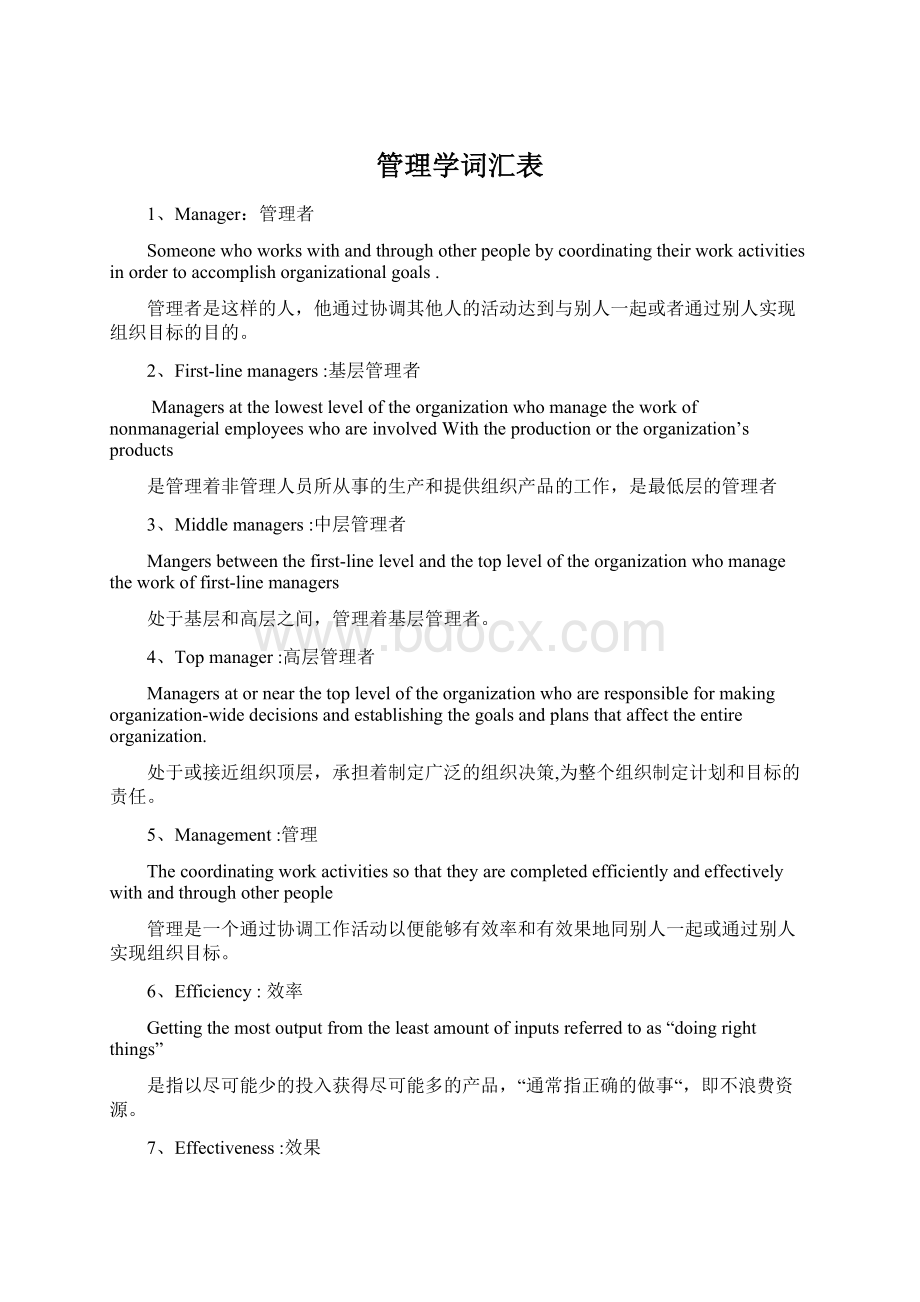管理学词汇表.docx
《管理学词汇表.docx》由会员分享,可在线阅读,更多相关《管理学词汇表.docx(58页珍藏版)》请在冰豆网上搜索。

管理学词汇表
1、Manager:
管理者
Someonewhoworkswithandthroughotherpeoplebycoordinatingtheirworkactivitiesinordertoaccomplishorganizationalgoals.
管理者是这样的人,他通过协调其他人的活动达到与别人一起或者通过别人实现组织目标的目的。
2、First-linemanagers:
基层管理者
ManagersatthelowestleveloftheorganizationwhomanagetheworkofnonmanagerialemployeeswhoareinvolvedWiththeproductionortheorganization’sproducts
是管理着非管理人员所从事的生产和提供组织产品的工作,是最低层的管理者
3、Middlemanagers:
中层管理者
Mangersbetweenthefirst-linelevelandthetopleveloftheorganizationwhomanagetheworkoffirst-linemanagers
处于基层和高层之间,管理着基层管理者。
4、Topmanager:
高层管理者
Managersatornearthetopleveloftheorganizationwhoareresponsibleformakingorganization-widedecisionsandestablishingthegoalsandplansthataffecttheentireorganization.
处于或接近组织顶层,承担着制定广泛的组织决策,为整个组织制定计划和目标的责任。
5、Management:
管理
Thecoordinatingworkactivitiessothattheyarecompletedefficientlyandeffectivelywithandthroughotherpeople
管理是一个通过协调工作活动以便能够有效率和有效果地同别人一起或通过别人实现组织目标。
6、Efficiency:
效率
Gettingthemostoutputfromtheleastamountofinputsreferredtoas“doingrightthings”
是指以尽可能少的投入获得尽可能多的产品,“通常指正确的做事“,即不浪费资源。
7、Effectiveness:
效果
Completingactivitiessothatorganizationalgoalsareattainedreferredtoas“doingtherightthings”
通常指“做正确的事“,即所从事的工作和活动有利于组织达到目标。
8、Planning:
计划
Managementfunctionthatinvolvestheprocessofdefininggoals,establishingstrategiesforachievingthosegoals,anddevelopingplanstointegrateandcoordinateactivities
包括定义目标,制定战略以获取目标,以及制定计划和协调活动的职能。
9、Organizing:
组织
Managementfunctionthatinvolvestheprocessofdeterminingwhattasksaretobedone,whoistodothem.Howthetasksaretobegrouped,whoreportstothem,andwheredecisionsaretomade.
指决定应该从事那些任务,应该有谁来从事这些任务,这些任务怎么分类和归集,谁向谁报告,以及在哪一级做处决策的职能。
10、Leading:
领导
Managementfunctionthatinvolvesmotivatingsubordinates,influencingindividualsorteamsastheywork,selectingthemosteffectivecommunicationchannelsordealinginanywaywithemployeebehaviorissues.
指激励下属,影响工作中的个体或团队,选择最有效的沟通渠道,或者以任何方式处理雇员的行为问题的职能。
11、Controlling:
控制
Managementfunctionthatinvolvesmonitoringactualperformance,comparingactualtostandard,andtakingaction,ifnecessary.
指监控、评估工作实际绩效并与预先设定的目标进行比较,如果出现偏差,着采取措施使工作绩效回到正常的工作轨道上来的职能。
12、Managementprocess:
管理过程
Thesetofongoingdecisionsandworkactivitiesinwhichmanagersengageastheyplan,organize,lead,andcontrol.
指一组进行中的决策和工作活动,在这个过程中管理者从事计划、组织、领导和控制。
13、Managementroles:
管理角色
Specificcategoriesofmanagerialbehavior
指特定的管理行为类型
14、Interpersonalroles:
人际关系角色
Managerialrolesthatinvolvepeopleandotherdutiesthatareceremonialandsymbolicinnature.
包含了人与人(下级和组织外的人),以及其他具有礼仪性和象征性的职责。
15、Informationalroles:
信息传递角色
Managerialrolesthatinvolvereceiving,collecting,anddisseminatingInformation.
包括接受、收集和传播信息。
16、Decisionalroles:
决策制定角色
Managerialrolesthatrevolvearoundmakingchoices.
是作出抉择的活动。
17、Technicalskills:
技术技能
Knowledgeofandproficiencyinaspecializedfield.
指熟悉和精通某种特定专业领域的知识。
18、Humanskills:
人际技能
Theabilitytoworkwellwithotherpeopleindividuallyandinagroup.
知道如何与员工沟通,如何激励。
引导和鼓舞员工的热情和信心,使员工做出最大的努力。
19、Conceptualskills:
概念技能
Theabilitytothinkandtoconceptualizeaboutabstractandcomplexsituations
是管理者对复杂和抽象的情况进行概念化的技能。
20、organization:
组织
Adeliberatearrangementofpeopletoaccomplishsomespecificpurpose.
是一种实体,他具有明确的目的,包含人员和成员以及具有某中精细的结构。
21、universalityofmanagement:
管理的普遍性
Therealitythatmanagementisneedinalltypesandsizesoforganizations,atall
organizationallevel,inallorganizationalareas,andinorganizationsinallcountriesaround
theglobe.
是指无论组织规模的大小,无论在组织的哪一个层次上,无论组织的工作领域是什么,无论这个组织位于哪一个国家,这个组织都需要管理。
Chapter2:
ManagementYesterdayandToday
1、Divisionoflabor:
劳动分工
Thebreakdownofjobsintonarrowandrepetitivetasks.
即将工作分解为狭隘的重复性的任务。
2、Industrialrevolution:
Theadventofmachinepowermassproduction,andefficienttransportation.
产业革命:
机器动力的出现而带来的产量的增加及运输效率的提高。
3、Scientificmanagement:
科学管理
Theuseofscientificmethodtodeterminethe“onebestway”forajobtobedone.
运用科学方法确定从事工作的“最佳方式”。
4、Therbligs:
分类体系
Aclassificationschemeforlabeling17basichandmotions.
一个分析了17种手的动作(如抓取,持握等)的体系。
5、Generaladministrativetheorists:
一般行政管理理论
Writerswhodevelopedgeneraltheoriesofwhatmanagersdoandwhatconstitutesgoodmanagementpractice.
笔者发展出了关于管理者做什么,以及什么构成了良好的管理实践的更一般的理论。
6、Principlesofmanagement:
管理原则
Fundamentalrulesofmanagementthatcouldbetaughtinschoolsandappliedinallorganizationalsituations.
管理的一些基本原则,他们能够在学院里教授这些原则,并可用于所有的组织情景。
7、Bureaucracy:
官僚行政组织
Aformoforganizationcharacterizedbydivisionoflabor,aclearlydefinedhierarchy,detailedrulesandregulations,andimpersonalrelationships.
这是一种组织形式,其特征依据劳动分工原则,具有清楚定义的层次,详细的规则和规章制度,以及非个人的关系。
8、Quantitativeapproach:
数量方法:
Theuseofquantitativetechniquestoimprovedecisionmaking.
是采用定量技术改进决策制定,这种方法也称为运筹学和管理科学。
9、Organizationalbehavior(OB):
组织行为
Thefiledofstudyconcernedwiththeactions(behavior)ofpeopleatwork.
这个领域的研究涉及了工作中人的行为。
10、Hawthornestudies:
霍桑研究
Aseriesofstudiesduringthe1920sand1930sthatprovidednewinsightsinindividualand
groupbehavior.
在1920-1930期间进行的提供关于个别和小组举止行为的新见解的一系列研究。
11、System:
系统
Asetofinterrelatedandinterdependentpartsarrangedinamannerthatproducesaunified
whole.
是一组向互联系和相互依赖的组成部分,它们共同构成一个统一的整体。
12、Closedsystems:
封闭系统
Systemsthatarenotinfluencedbyordonotinteractwiththeirenvironment.
不与它所处的环境发生作用,不受环境的影响。
13、Opensystems:
开放系统
Systemsthatdynamicallyinteractwiththeirenvironment.
动态地与它所处的环境发生作用。
14、Contingencyperspective:
权变观点(有时又称为情境方式):
Anapproachthatsaysthatorganizationsaredifferent,facedifferentsituations(contingencies),andrequiredifferentwaysofmanaging.
它强调这样一个事实,因为组织不同,他们所面对的情境不同,因此可能要求不同的管理方式。
15、Workforcediversity:
劳动力多元化
Aworkforcethat’smoreheterogeneousintermsofgender,race,ethnicity,age,andothercharacteristicsthatreflectdifferences.
即员工队伍在性别,种族,民族,年龄和其他特征方面更加多样化。
16、Entrepreneurship:
创业精神
Theprocesswherebyanindividualoragroupofindividualsusesorganizedeffortsandmeanstocreatevalueandgrowbyfulfillingwantsandneedsthroughinnovationanuniqueness,nomatterwhatresourcesarecurrentlycontrolled.
即某个人或者某个群体通过有组织的努力,以创新的和独特的方式追求机会,创造价值和谋求增长,不管这些人手中是否拥有资源。
17、E-business(electronicbusiness):
电子经营型企业
Acomprehensivetermdescribingthewayanorganizationdoesitsworkbyusingelectronic(internetbased)linkageswithitskeyconstituenciesinordertoefficientlyandeffectivelyachieveitsgoals。
它描述了一个有组织通过电子联结与它的关键利益相关者开展工作的方式,以便更有效率和更有效果地实现其目标。
18、E-commerce(electroniccommerce):
电子商务
Thesalesandmarketingcomponentofe-business.
是企业与其利益方通过电子方式进行交换与交易的任何形式。
19、Intranet:
企业内部网
Aninternalorganizationalcommunicationsystemthatusesinternettechnologyandisaccessibleonlybyorganizationalemployees..
一种组织内部的交流系统,它利用互联网技术但是只允许组织内部人员进入该网络,与处于全球各个场所的部门和人员进行交流。
20、Totalqualitymanagement(TQM):
全面质量管理
Aphilosophyofmanagementthatisdrivenbycustomerneedsandexpectationsandfocusesoncontinualimprovementinworkprocesses.
一种管理哲学,它被响应顾客需要和期望所驱动,并在工作过程中关注持续不断地改进。
21、Learningorganization:
学习型组织
Anorganizationthathasdevelopedthecapacitytocontinuouslylearn,adapt,andchange.
具有发展持续学习和适应变革的能力的组织。
22、Knowledgemanagement:
知识管理
Cultivatingalearningcultureinwhichorganizationalmemberssystematicallygatherknowledgeandshareitwithothersintheorganizationtoachievebetterperformance.
培育一种学习文化,在这种文化中组织成员能够系统地收集知识和其他组织成员共享它,以便取的更好的成绩。
Chapter3OrganizationalCultureandEnvironment:
TheConstraints
1、Omnipotentviewofmanagement:
管理万能论:
Theviewthatmanagersaredirectlyresponsibleforanorganization’ssuccessorfailure.
管理者对组织的成败负有直接责任。
2、Symbolicviewofmanagement:
管理象征论:
Theviewthatmanagershaveonlyalimitedeffectonsubstantiveorganizationaloutcomesbecauseofthelargenumberoffactorsoutsidetheircontrol.
管理者影响结果的能力受外部因素的制约和约束。
3、Organizationalculture:
组织文化
Asystemofsharedmeaningwithinanorganizationthatdeterminesinlargedegreehowemployeesact.
组织成员共有的价值和体系。
这一体系在很大程度上决定了组织成员的行为方式。
4、Strongculture:
强文化
Organizationsinwhichthekeyvaluesareintenselyheldandwidelyshared.
强烈拥有并广泛共享基本价值观的文化。
5、Socialization:
社会化
Theprocessthatadaptsemployeestotheorganization’sCulture
是指雇员适应组织文化所经历的过程。
6、Externalenvironment:
外部环境
Outsideinstitutionsorforcesthatpotentiallyaffectanorganization’sperformance.
指能够对组织绩效造成潜在影响的外部力量和机构。
7、Specificenvironment:
具体环境
Thepartoftheenvironmentthatisdirectlyrelevanttotheachievementofanorganization’sgoals.
包括那些对管理者的决策和行动产生直接的影响并与实现组织目标直接相关的要素。
8、Generalenvironment:
一般环境
Broadexternalconditionsthatmayaffecttheorganization.
包括可能影响组织的广泛的经济条件;政治/法律条件;社会文化条件;技术条件和全球条件。
9、Environmentaluncertainty:
环境的不确定性
Thedegreeofchangeandcomplexityinanorganization’senvironment.
组织环境的变化程度和复杂程度。
10、Environmentalcomplexity:
环境复杂性
Thenumberofcomponentsinanorganization’senvironmentandtheextentofanorganization’sknowledgeaboutitsenvironmentalcomponents.
组织环境中的要素数量以及组织所拥有的与这些要素相关的知识广度。
11、Stakeholders:
利益相关者
Anyconstituenciesintheorganization’sexternalenvironmentthatareaffectedbyanorganization’sdecisionsandactions(andthatcaninfluencetheorganization.)
组织外部环境中受组织决策和行动影响的任何相关者。
12、Boundaryspanning:
跨域管理
Interactinginspecificwayswithvariousexternalstakeholderstogatheranddisseminate
importantinformation.
采用更具体的方式与各种外部利益相关者开展互动合作,以收集和传播重要的信息。
13、Stakeholderpartnerships:
利益相关者伙伴关系
Proactivearrangementsbetweenanorganizationandastakeholdertopursuecommongoals
为追求共同目标而在组织和利益相关者之间达成的非正式协议。
14、Workplacespirituality:
工作场所的精神境界
Arecognitionofa